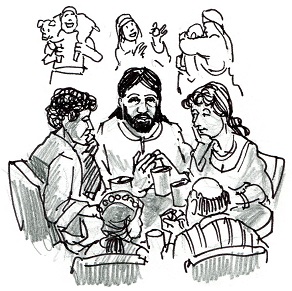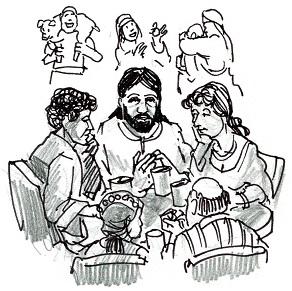

“But blessed are your eyes, because they see, and your ears, because they hear” (Matt 13:16).
Jer 2:1-3, 7-8, 12-13; Matt 13:10-17
The disciples asked Jesus why he taught in parables. Jesus chose parable storytelling because it was the most effective way to invite people freely into a message with many levels of understanding and possible responses. Readiness was key. Some people heard only an interesting story. Others sensed that the literal details were only the surface of a deeper message. Some were drawn to the storyteller and felt called to follow him.
The parables were also about ordinary activities people could understand that then reveal the hidden reality of God’s Kingdom present in them.
For example, the parable of the sower was about more than farming. On the surface, it was a dramatic story of survival. The annual planting had to succeed to prevent a famine. Failure to sow valuable seed grain was a serious matter. But this story was about more than good agriculture. The seed stood for something. The obstacles preventing it from taking root were dramas of choice and receptivity. The surprising harvest was about securing new life despite life’s challenges. The turning point from loss to gain was the generous miracle that happens when seed fell on good ground. Listening deeply produces a harvest of Good News.
Jesus answers his disciples by describing the frustration of the early prophets when announcing God’s message. People did not want to understand and so they closed their ears and eyes. Parables reveal the message to believers but screen out others. Disciples hear and understand the parables about God’s Kingdom, but others are not ready to hear its invitation. They do not hear or see because their hearts are dense. Disciples are blessed because God enables them to see and hear the deeper meaning of the story.
As the Gospels unfold, we realize that even the disciples were slow to grasp the message. Only with experience did they enter the truth of Jesus, who is himself the seed that falls to the ground and dies in order to multiply. Only then were they ready to follow him through the same process of surrender that made them Apostles of the Paschal Mystery, dying to themselves to share in the new life Jesus demonstrates by his cross and resurrection. This was the ultimate parable.
We, too, begin our journey of faith at the edge of the crowd surrounding Jesus. If we stop to listen, we hear engaging stories. If we sense we are being invited to open our hearts and let the questions probe who we are and what we desire, then we can fix our eyes on the storyteller. Jesus is himself the mystery, the prize that invites us know God as he did. He captures us and draws us to make our home in the life of God being offered to us.
Isn’t this why Jesus tells parables?
Advertisement






